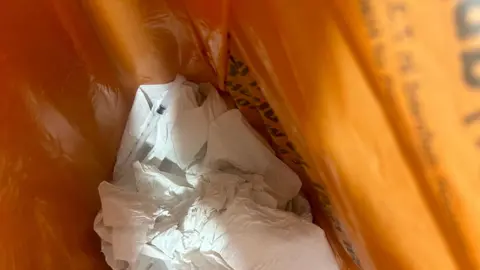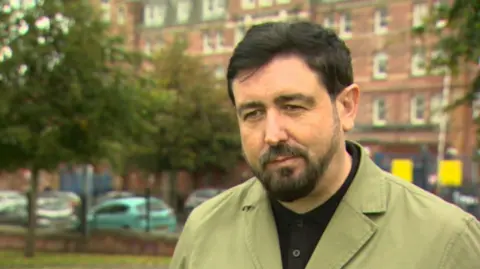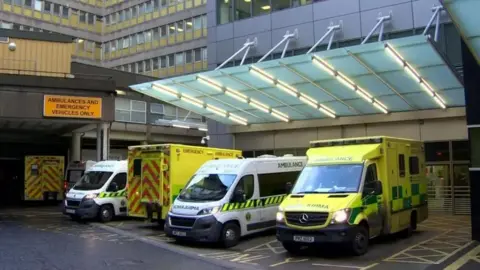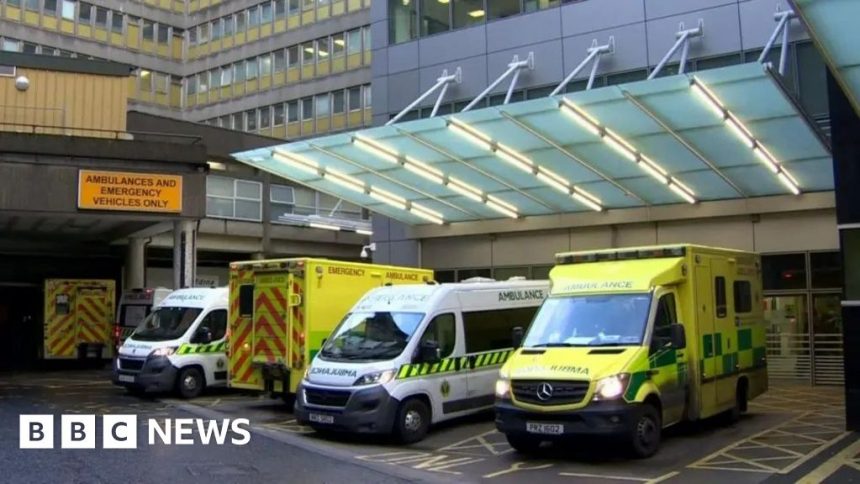‘Disgusting’ drug dealing in hospital condemned
 BBC
BBCCriminals using the waiting room in a busy hospital emergency department (ED) to deal drugs have been branded as “disgusting”.
There have been 22 reports of drug dealing at Northern Ireland’s biggest hospital, the Royal Victoria Hospital (RVH) in Belfast, in 2024.
One woman has told BBC News NI that she was in a hospital waiting room with her mother when she witnessed people sharing drugs with a patient who had been brought to hospital earlier that evening.
The Belfast Trust said the increase in drug taking and dealing on its sites was a worrying trend.
Used needles, seen by BBC News NI, were found in the disabled toilet/baby change bins in the ED toilets.
Figures obtained through a freedom of information (FOI) request to the Police Service of Northern Ireland (PSNI) show an increase in anti-social behaviour, including drug usage and drug dealing.
From January to August 2024, there were 22 reports of drug dealing in and around the hospital compared to five reports in the same period in the previous year, meaning reports have quadrupled in one year.
The figures also showed 19 arrests were made in the first half of 2024 for at least one drug offence, such as possession or trafficking.
But the FOI request notes state that due to the nature of gathering information, there could be more incidents that fall outside the method of data search.
‘It’s just ridiculous’
The woman, who was with her mother, said: “They were sitting on the chairs in the waiting area, sharing out tablets amongst themselves, working out what tablets to get ordered to be brought up to the hospital.”
“They were making phone calls to whoever it was that they were getting the drugs from, to get them delivered to the hospital.
“To be sitting in A&E, surrounded by sick, vulnerable people with this going on in front of you, it’s just ridiculous.
“That even the staff are having to deal with that on a daily basis, never mind the sick patients who are coming into the hospital.
“To sit there, with my sick mother, and witness that going on, was disgusting.”
What I saw in the ED – by Claire Graham, BBC News NI reporter
It was a busy Friday night when I headed to the ED. No cameras, no microphones, simply to take a look.
In that small snapshot, about 90 minutes or so, in a busy waiting room filled with patients listening out for their names to be called, in wheelchairs, in pain, dozing off.
I listened to phone calls where members of the public were calling and ordering drugs.
People in the room were asking friends around them if they had any drugs they could have.
While I didn’t see anyone take any drugs or have any in their possession, in the disabled toilet, which is used as the baby change facility, I saw drug paraphernalia in the bin, a needle in amongst hand towels.
‘Very dangerous activity’

Social Democratic and Labour Party councillor Paul Doherty said anti-social behaviour had always been an issue at the RVH site, but it had “never been as bad”.
“This is the last thing people need. They’re coming in, either seriously ill or ill with their loved ones or family, and they’re walking straight in to this very dangerous activity here on this Royal site,” he told BBC News NI.
“I have heard from people who have challenged this.
“They’re bringing in elderly and vulnerable, and unwell family members and walking in to activity where people are either using drugs or dealing drugs and challenging that, saying, ‘Are you aware of where you are and people are going through a very difficult time here?’
“It’s about awareness; it’s about reporting, and I know that many of the Royal staff here have been reporting on an ongoing basis.”
In May, the Belfast Health Trust told the BBC it was working closely with the police and local community representatives to address the issue.

Targeted patrols
In a statement, the Belfast Trust said it was “concerned about an increase in antisocial behaviour including drug usage and drug dealing on the Royal Hospitals site”.
“We are working closely with PSNI colleagues and local community representatives to address this worrying trend,” a spokesperson said.
“We would ask everyone to please be respectful of your hospitals and community sites to help keep them safe places for your family and friends to attend.”
Ch Insp Claire Hamilton said: “[The PSNI] will continue to use high visibility, targeted patrols… have utilised police dogs who are specially trained to detect drugs, to disrupt and arrest those involved in the sale and supply of drugs, and put them before the courts”.
She added that drug dealing and substance misuse was a “policing priority,” and police will continue to work “with communities and partner agencies to reduce the threat of harmful and illegal activity”.
“We are asking everyone for their support and cooperation in tackling this problem through the criminal justice system,” she said.







